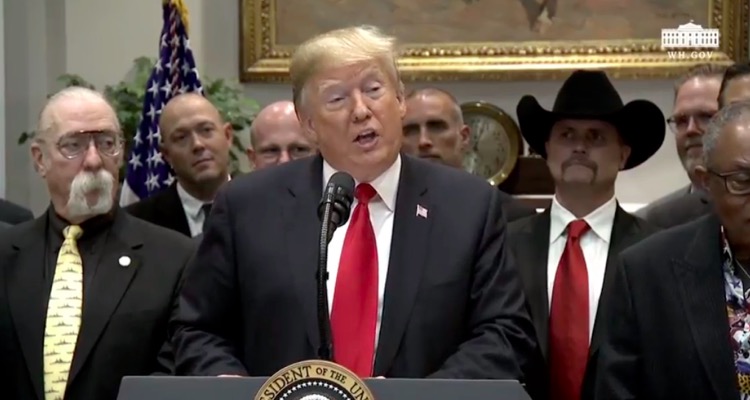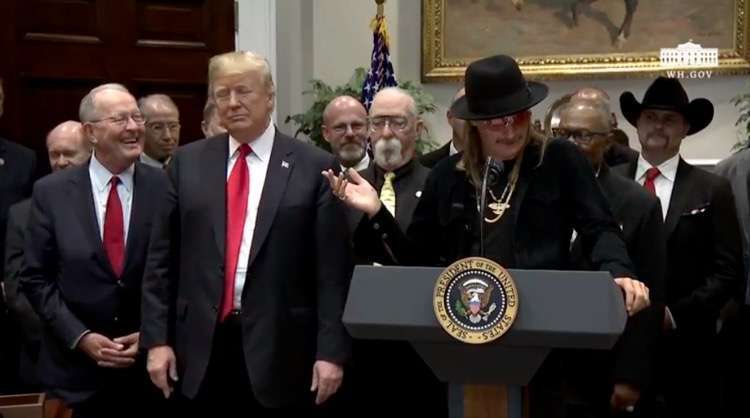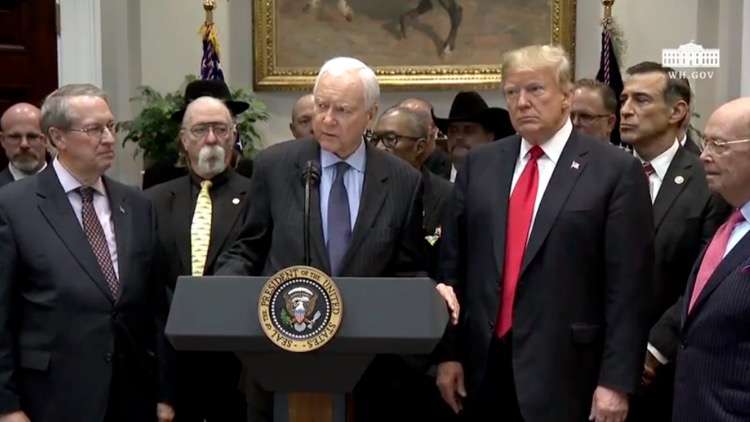
President Donald Trump has just signed the Music Modernization Act following unanimous approval in both the U.S. House of Representatives and the Senate.
The Music Modernization Act is now the law of the land, thanks to a signature from President Trump. The signing ceremony, which occurred shortly after noon ET, involved a long list of songwriters and famous musicians.
The bill, officially listed as “H.R. 1551, the Orrin G. Hatch-Bob Goodlatte Music Modernization Act’,” was praised as a progressive step forward by Trump.
Accordingly, Utah Senator Orrin Hatch and Virginia Representative Bob Goodlatte were also on hand to praise the passage of the bill.
The signing ceremony was first tipped by Digital Music News earlier this week, based on reports from numerous industry sources. But we did get one thing wrong: Kanye West didn’t appear alongside President Trump for the signing as expected — or at least not close enough to be captured by the cameras. That misinformation was unfortunately parroted by a number of other publications, including Variety, though it appears that the rapper is still slated to meet with the president and Jared Kushner to discuss other issues.
West also didn’t get a speech, perhaps for obvious reasons.
Instead, the biggest celebrity sitting next to Trump was Kid Rock, a longtime and outspoken supporter of the president. In a brief speech, Kid Rock heralded the Music Modernization Act as a big step forward for songwriters who toil in the background, often unrecognized and underpaid.
Kid Rock remarked that the music industry is “still a dirty business,” but noted that things will be cleaned up a bit by this legislation.
Other musicians on hand included John Rich, Craig Morgan, Jeff “Skunk” Baxter of the Doobie Brothers, Christian rock group MercyMe, and Mike Love of the Beach Boys.
Trump himself noted that the Act passed both the Senate and House of Representatives unanimously. “How’d you do that?” Trump asked, while using the Act as proof that bipartisanship was possible.
“The Music Modernization Act closes loopholes in our digital royalties laws to ensure that songwriters, artists and producers receive fair payment for licensing of music,” Trump said. “They were treated very unfairly. They’re not going to be treated unfairly anymore.”


The bill itself revamps a number of aspects of Section 115 of the U.S. Copyright Act, spanning everything from streaming music royalties to oldies recordings.
We’ll have a highly-detailed review of what this bill means in the next Digital Music News Podcast, but here’s a quick overview of what the MMA contains.
The law itself includes a lot of smaller initiatives, making it a ‘mega-bill’ of sorts. The main components are:
(a) The core Music Modernization Act transforms and streamlines the payment of mechanical royalties by streaming services like Spotify.
Specifically, those royalties will now be administered by a centralized agency, the Mechanical Licensing Collective, or MLC, which will both collect and administer mechanicals to songwriters and publishers. Previously, Spotify, Apple Music, and other streaming services were either skipping those payouts entirely, or simply couldn’t locate the copyright owners. Only a modest percentage of mechanical licenses were actually reaching the proper copyright owners.
(b) The Compensating Legacy Artists for their Songs, Service, & Important Contributions to Society (CLASSICS) Act changes the law for pre-1972 recordings.
In a nutshell, this makes recordings released before 1972 eligible for federal copyright protection. Accordingly, that means that companies like Sirius XM Radio will have to radically expand their payouts under law, and potentially scrap a patchwork of earlier agreements related to oldies royalties.
(c) The Allocation for Music Producers (AMP) Act gives producers credit and proper payouts.
Previously, producers, mastering engineers, and other behind-the-scenes contributors were not only left out of the credits, they weren’t getting paid in many cases. This codifies their participation by law, and guarantees their proper payment from SoundExchange (which handles royalties from non-interactive streaming recordings).
Mitch Glazier, president of the Recording Industry Association of America (RIAA), was also on hand.
“The Music Modernization Act is now the law of the land, and thousands of songwriters and artists are better for it,” Glazier stated. “The result is a music market better founded on fair competition and fair pay.
“The enactment of this law demonstrates what music creators and digital services can do when we work together collaboratively to advance a mutually beneficial agenda.”
Also on hand was current Recording Academy president Neil Portnow, and National Music Publishers’ Association (NMPA) chief David Israelite. Portnow got a special mention from Trump as being a ‘big deal’ in the music industry, particularly because of his leadership over the Grammys.
Israelite is regarded as a critical figure in this legislative victory, with attorney Dina LaPolt also playing a core role according to our sources (though we didn’t spot LaPolt at the signing ceremony).


Nevertheless, I still object. The music industry is in 1909, but does not yet realize it.